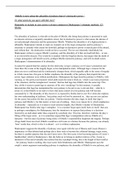‘Othello is more about the absurdity of jealousy than it’s destructive power.’
To what extent do you agree with this view?
Remember to include in your answer relevant comment in Shakespeare’s dramatic methods. (25
Marks)
The absurdity of jealousy is what drives the plot of Othello, this being that jealousy is presented to such
an obscene extreme or arguably unrealistic extent, but its destructive power is what causes the demise of
several principal characters and the eponymous Othello. Whether the absurdity is of a higher priority is
debatable, Shakespeare intends to make an example out of his tragic protagonist and his jealousy’s
extremity is certainly what causes his downfall, perhaps its destructive power is merely part of the absurd,
and without that - the destruction would not have occurred. The two are inherently interlinked, but
Shakespeare wishes to expose Othello’s jealousy, and the absurdity of it that can lead both him – or one –
to an irreversible descent. This would be in tandem with the Hegelian theory, that argues that the death of
a tragic protagonist will benefit society, perhaps Othello represents jealousy, and with its death comes
Shakespeare’s demonstration of its absurdity.
It cannot be ignored that the catalyst for the entire play is Iago’s jealousy over Cassio’s promotion and
from there the events of the tragedy begin, as his manipulation starts. Although Iago’s reasons for his
plans are never confirmed and he continuously changes them, which arguably adds to the sense of tragedy
as it feels cause-less, this goes to further emphasise the absurdity of his jealousy that propels him into
action. Iago continues even without justification. Shakespeare has Iago describe jealousy to Othello, with
warning, as ‘the green-eyed monster which doth mock the meat it feeds on,’ which is an ironic projection
of his situation, and the metaphorical ‘monster’ that has had Iago lure Othello into the same trap. This
line, whilst it seems to paint Iago as unaware of his own ‘mock(ing)’ by this monster, it actually
demonstrates that Iago has manipulated his own jealousy to be put to use, to elevate him – what he is
aware of, is that Othello is too naïve to have that same control over his jealousy and will become
consumed by it. The absurdity of this, however, is exposed by Emilia later in Act Five when she explains
her own understanding of jealousy, ‘but jealous souls will not be answered so... they are not ever jealous
for the cause, but jealous for they are jealous.’ Emilia reiterates the idea, tragic in itself, that Iago’s
jealousy and Othello’s, for that matter, is born out of nothing – there is no reason for it, which emphasizes
its absurdity – especially as it is taken to such extreme lengths, like Othello’s murder of Desdemona.
Shakespeare has Emilia echo Iago’s metaphor, ‘it is a monster begot upon itself, born on itself,’ that acts
as perhaps a mouthpiece for Shakespeare; here his intention is to express that jealousy is a decision
festered by an individual rather than conjured by somebody else. This line, therefore, redeems the play’s
fitting of the tragic norm – as it is sometimes argued that Iago’s manipulation relieves Othello of a
hamartia – but this idea of jealousy being solely of Othello’s responsibility heightens the tragedy. Perhaps
if Iago hadn't been involved, Othello would have still come to a demise because this jealousy was already
‘born’ inside him, which is why it is absurd – as it is without explanation.
Shakespeare suggests the absurdity of jealousy once again with the use of Bianca and Cassio; Bianca’s
importance is often debated and perhaps she is there only to become the collateral damage, tragic waste,
but there is another purpose that she and Cassio serve. Her first scene is her becoming jealous of Cassio’s
handkerchief, which is Desdemona’s, that she believes to belong to another mistress of his. Cassio is
dismissive of her and eventually she realizes that she is perhaps wrong, this is the height of their conflict
– her jealousy leads to nothing, this exact scene foils Desdemona and Othello. Shakespeare uses the
couple’s minor argument surrounding jealousy to emphasize the absurdity of Othello's own jealousy, and




